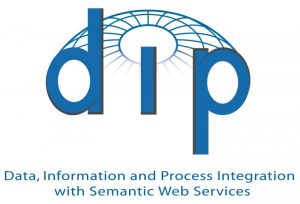News Story
DIP Review an Overwhelming Success
Monday 20 Mar 2006
DIP is a 3-year 11 million UKP EU Integrated Project, on semantic web services, involving 16 partners from 10 countries. Like most EU projects DIP is subject to a two day annual review involving three external reviewers and a project officer from the funding unit. DIP’s second annual review was held last week in the executive boardrooms of SAP at the world headquarters in Walldorf, Germany. The review went extremely well with the final summary from our project officer including the following phrases: "We are all very pleased with the project" "We are impressed with standardisation" "Excellent presentation I wasn’t bored at all for 2 days. It is very impressive that you were able to do that. I personally learnt a lot about semantic web services" Although the formal report is not due for five weeks we fully expect that it will contain no recommendations – DIP is performing extremely well by all standard metrics. KMi has a significant involvement in DIP – KMi’s Deputy Director John Domingue is the Scientific Director for DIP. Additionally, half of the demonstrations were based on KMi’s semantic web service infrastructure IRS-III and the eGovernment case study incorporated web services from BuddySpace. The DIP team at KMi incorporates: Roxana Belecheanu, Liliana Cabral, Stefania Galizia, Alessio Gugliotta, Barry Norton, Carlos Pedrinaci and Vlad Tanasescu. DIP will finish at the end of 2006 and the focus for the remaining period will be to continue to standardize results within W3C and OASIS and to lay the foundations for SUPER, LUISA and the Living Human Digital Library – three new EU projects which will apply DIP results to business process management, elearning and biomechanics.
Latest News
PhD Awarded for Groundbreaking Research on Game-Based Cyber Security Training
KMi at the Palace of Westminster: Exploring Blockchain for Society and Economy
OUAnalyse at the Digital Ethics Summit 2025: Advancing Responsible AI in Education

